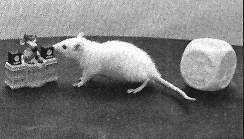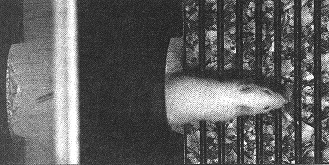People who are constantly looking for the thrill of new experiences and the cocaine user in search of a "high" may have something in common, according to NIDA-funded researchers. In a series of studies with rats, the researchers have shown that the search for novel experiences activates the brain's reward system in the same way that drugs of abuse do.
The fact that novelty seekers may be tapping into the same primal reward mechanisms as drug abusers do provides a biological interpretation for the fact that individuals who constantly seek new and exciting experiences are much more likely to abuse drugs than are individuals who have less need for novel stimulation, says Dr. Michael Bardo of the University of Kentucky. The finding suggests new ways to reach such individuals with drug abuse prevention interventions, says Dr. Bardo, who was the lead researcher in a number of the studies.
 This rat is investigating novel objects in a playground maze. Research has demonstrated that rats raised to seek novelty are more sensitive to the acute rewarding effects of amphetamines than are rats raised not to seek novelty.
This rat is investigating novel objects in a playground maze. Research has demonstrated that rats raised to seek novelty are more sensitive to the acute rewarding effects of amphetamines than are rats raised not to seek novelty.Previous animal studies that have looked at the biological link between novelty and drug abuse have indicated that forced exposure to novelty can produce a stressful effect on rats. These studies found that when rats were placed in an inescapable novel environment, their activity increased and their stress hormones rose. Rats that were more responsive to this forced exposure to novelty were more likely to self-administer drugs, these studies found.
Dr. Bardo's work investigated the possibility that novelty, if it were freely chosen rather than inescapable, could produce a biologically rewarding effect that is similar to the reinforcing effect produced by drugs of abuse.
In a series of experiments, he found that given a free choice, rats liked novelty and that this preference for novelty could be eliminated by administering a drug that blocked the rats' brain receptors for dopa-mine, a neurotransmitter associated with pleasure and drug abuse. Dr. Bardo also found that rats raised to seek novelty were more sensitive to the acute rewarding effects of amphetamines than were rats raised not to seek novelty. In addition, Dr. Bardo's research team demonstrated that novelty seeking activates the mesolimbic dopamine system, the brain's reward pathway, in the same way that drugs of abuse do.
In the latter experiment, Dr. Bardo collaborated with Dr. George Rebec of Indiana University, another NIDA-funded researcher, to discover that when rats peered into or explored an unfamiliar compartment, there was a marked but transient increase in brain dopamine metabolite levels in the precise region of the brain's reward pathway that is thought to be critical to drug abuse.
 When rats, such as this one, peered into or explored an unfamiliar compartment, there was an increase in brain dopamine metabolite levels in the precise region of the brain's reward pathway that is thought to be critical to drug abuse. The finding suggests that novelty could substitute for and reduce drug use behavior among sensation-seeking humans.
When rats, such as this one, peered into or explored an unfamiliar compartment, there was an increase in brain dopamine metabolite levels in the precise region of the brain's reward pathway that is thought to be critical to drug abuse. The finding suggests that novelty could substitute for and reduce drug use behavior among sensation-seeking humans."Finding that novelty may stimulate the same anatomically distinct brain reward component that drugs do is exciting because it suggests that novelty could substitute for and reduce drug use behavior among sensation-seeking humans," says Dr. Bardo. In fact, Dr. Lewis Donohew, a social scientist and Dr. Bardo's colleague at the NIDA-funded University of Kentucky Center for Prevention Research, is currently testing a drug abuse prevention media campaign that offers stimulating new alternative activities to high-sensation-seeking young adults in hopes of providing a substitute for the rewarding effects of drugs, says Dr. Bardo. (See "Novel Drug Abuse Prevention Ads Get Strong Response From High-Sensation Seekers")
"We're not saying that there is only one biological factor in terms of drug abuse," says Dr. Bardo. "We are saying that there are bio-logically based individual differences in how rewarding or stimulating people find novelty to be, and these differences might explain to some degree why sensation-seeking humans might like and use drugs more frequently than those people who don't like a lot of novelty." Ideally, this knowledge could be used to identify children who might be at risk for drug abuse and provide appropriate alternative behavioral interventions before their first drug exposure, Dr. Bardo suggests.
Sources
- Bardo, M.T.; Bowling, S.L.; Robinet, P.M.; Rowlett, J.K.; Lacy, M.; and Mattingly, B.A. Role of dopamine D1 and D2 receptors in novelty-maintained place preference. Experimental and Clinical Psychopharmacology (1)1-4:101-109, 1993.
- Bowling, S.L., and Bardo, M.T. Locomotor and rewarding effects of amphetamine in enriched, social, and isolate reared rats. Pharmacology, Biochemistry and Behavior (48)2:459-464, 1994.
- Rebec, G.V.; Grabner, C.P.; Pierce, R.C.; and Bardo, M.T. Voltammetry in freely moving rats: Novelty-dependent increases in accumbal DOPAC. Abstract presented at the Annual Meeting of the Society for Neuroscience, 1994.
